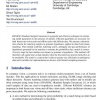Free Online Productivity Tools
i2Speak
i2Symbol
i2OCR
iTex2Img
iWeb2Print
iWeb2Shot
i2Type
iPdf2Split
iPdf2Merge
i2Bopomofo
i2Arabic
i2Style
i2Image
i2PDF
iLatex2Rtf
Sci2ools
109
click to vote
BMVC
2010
2010
Deterministic Sample Consensus with Multiple Match Hypotheses
RANSAC (Random Sample Consensus) is a popular and effective technique for estimating model parameters in the presence of outliers. Efficient algorithms are necessary for both frame-rate vision tasks and offline tasks with difficult data. We present a deterministic scheme for selecting samples to generate hypotheses, applied to data from feature matching. This method combines matching scores, ambiguity and past performance of hypotheses generated by the matches to estimate the probability that a match is correct. At every stage the best matches are chosen to generate a hypothesis. This method will therefore only spend time on bad matches when the best ones have proven themselves to be unsuitable. The result is a system that is able to operate very efficiently on ambiguous data and is suitable for implementation on devices with limited computing resources.
BMVC 2010 | Computer Vision | Frame-rate Vision Tasks | Limited Computing Resources | Random Sample Consensus |
Related Content
| Added | 10 Feb 2011 |
| Updated | 10 Feb 2011 |
| Type | Journal |
| Year | 2010 |
| Where | BMVC |
| Authors | Paul McIlroy, Edward Rosten, Simon Taylor, Tom Drummond |
Comments (0)

